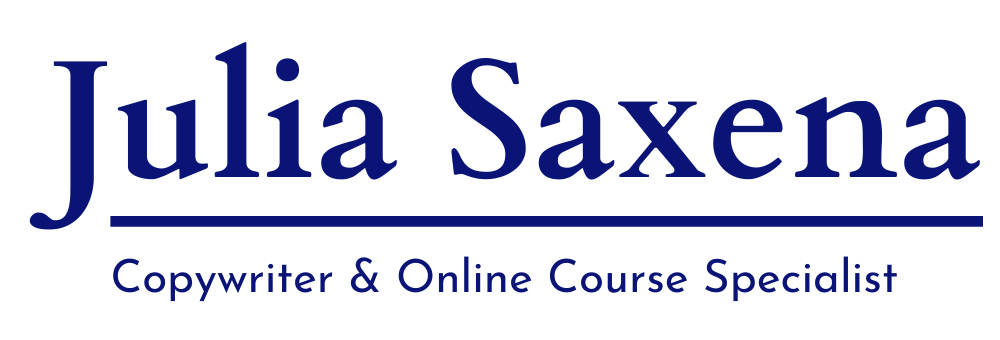What’s the most visited page on your website? Your homepage … duh. But what’s the second most visited page? It’s likely your about page. If you have one.
Strangely, a lot of businesses are choosing not to. For example:


Or they have an about page, but the messages are so abstract that they become meaningless. For example:


But why does this even matter? After all, people want the thing you’re selling, not become your best friends.
Why not showing up as yourself is a bad idea
Unless you’re creating a completely new product or service, there are other people in your space who do what you do. Often, the market is saturated, giving customers plenty of choices.
If so many businesses are offering the same, how do people decide from whom to buy? Well, they’re looking for a connection, something that stands out. But sleek, generic marketing messages create a slippery surface that’s too even to grab onto. Is this company run by robots? Because living, breathing human beings have edges and imperfections. Inherently, we’re suspicious of anything too perfect and tend to trust those who show their real, imperfect self.
If you take one thing away from this article, it’s that people do business with people. Even in the B2B space, you’re always dealing with another person who’d laugh at a joke and chat with you about their last camping trip. Being too formal in this context is a turn-off.
Showing up as yourself online is even more important for new businesses that don’t have testimonials, awards, or a long list of partners to show off yet. They need to take every opportunity to remove risk and build trust with their prospects.
Who would you rather hire? A faceless brand where you’ve no idea where they’re located, who’s working there, and what their story is? Or a company that proudly shares how they got started, introduces every employee, and oozes personality?
I’d choose the second business. You’ll know exactly who you’ll be dealing with right from the start. And I’m glad I’m not the only one who thinks this way.
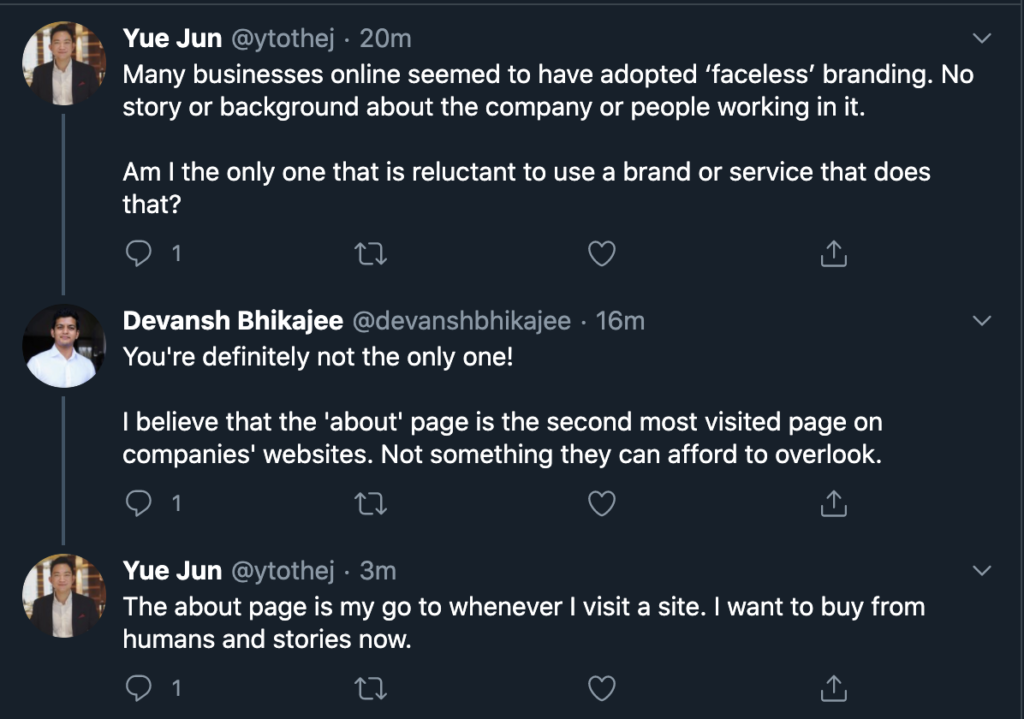
Why do business owners hide online?
There are four reasons why:
- It’s scary to be visible. What if your business fails? Nobody wants to look like a failure in front of their friends and partners. But remember that failures are necessary learning moments and a normal part of becoming successful in the long run. They surely make for great stories to tell.
- Many business owners don’t know any better. You might be following along what everyone else is doing. If it seems to work for them, why shouldn’t it work for you? The problem is, when too many companies follow the same pattern, they all blend in together.
- It’s easier and less work. If you’re already time-strapped, trying to get your business off the ground, then using a generic template with prefilled text for your website is a no brainer. But investing a little time now to write a personal story will benefit you manifold in the long run.
- You think you don’t have anything interesting to share about yourself. Maybe your founding story isn’t spectacular, but rather boring. Maybe you’re still fairly new to the space and don’t want to rub your lack of experience in your prospects face. But there’s always something that you can share to build a connection with your audience.
Here’s a better way
Your website has to communicate, “this person is legit and won’t screw me over.” And your about page is the perfect place to do that. Here are three ways to accomplish that. Each of them boosts your credibility and likeability. Use all of them or at least one.
Identify your unique advantages
You need to clearly answer the question why someone should buy from you instead of any and every other alternative out there.
I know it can be hard to describe yourself. Trying to think of anything that makes you unique, interesting, and fun is a great way to make your mind go blank. But, you are, in fact, a unique and interesting person. Seriously! Go ask your family and friends. With an outside perspective, they can often give you the best answers.
Here’s what to ask:
- What are you really good at?
- What credentials have you collected? (like what you’ve studied in school, courses, etc.)
- What past jobs did you have? And what experiences did you get?
- What are your unique viewpoints about your industry or the world in general?
- What compliments do you constantly receive from others?
- What do you do better than anybody else?
Writing this stuff down can feel like you’re bragging and hyping yourself up. That’s the point!
But won’t it become too much? Will I sound arrogant? To avoid that, we can use a handy cognitive bias called the Pratfall effect. It’s the counterintuitive idea that when you admit a weakness or a flaw, people will like and trust you more. When you’re demonstrating your honesty, the rest of what you claim becomes more believable.
Be careful not to reveal a weakness related to a critical core competency in your business, though. If you’re a project manager and you admit to being terrible at time management, then your customers will doubt your ability to get the job done. Instead, you could talk about how you struggle with making pancakes that don’t taste like paper.
Example:
Leanne of Make Creativity Pay does a great job of listing her very impressive credentials without coming across as cocky.
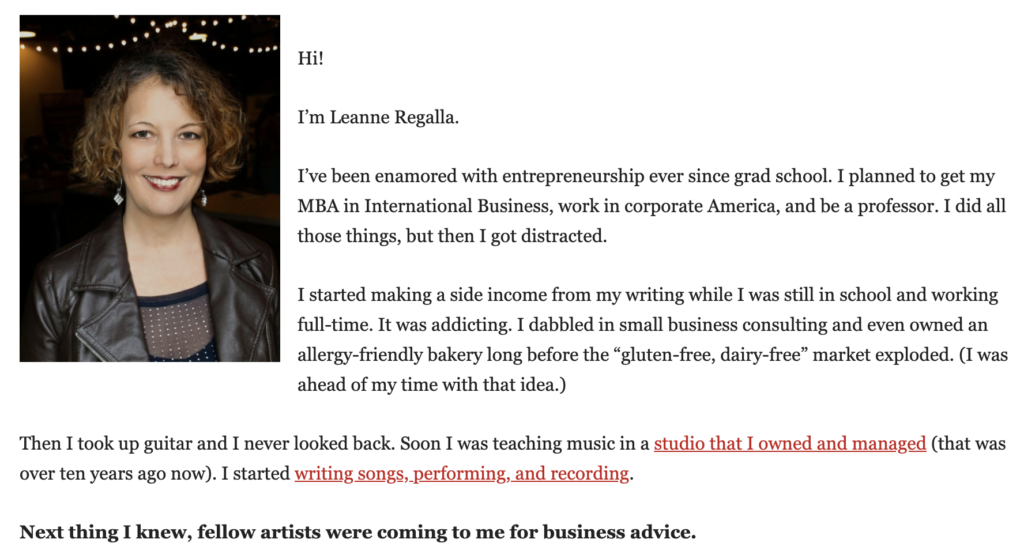
Define your vision, mission, values
“People don’t buy what you do. They buy why you do it.”
Simon Sinek
Many think this is something that big corporations do to at least pretend that they’re interested in something else than making money. But small businesses and personal brands can benefit a lot from this exercise.
When you get clear on your vision, mission, and values, you win in two ways: One, it grounds your business, makes decisions easier, and keeps your brand consistent. And two, people buy into why you’re doing what you’re doing. So, hopefully, there’s more to it than “making money.”
The questions below provide some guidance to clarify your vision, mission, and values.
Vision: It’s the ideal future state for your business, describes where you’re headed. Let your creativity run free and dream big.
- Where do you see your business in 10 years?
- What do you want to be known for?
Mission: It’s your purpose, the essence of your business, giving you a sense of direction, and acting as a filter for business decisions.
- Why do you do what you do?
- What are you here to accomplish?
Values: They are the identity of your business. Something you live by every day. They create the foundation for your brand and public image. And provide guidance for business decisions.
- What is more important to you in your business than making a quick buck?
- What behaviors do you want to see from yourself and other team members on a daily basis?
- What are you willing to hire/fire on?
- Which values will you still believe in after 5/10 years?
Examples:
Man Crates about page doesn’t mess around. In a few sentences, they’ve hooked you with their fun personality and razor-sharp mission. You can’t help but like these guys.
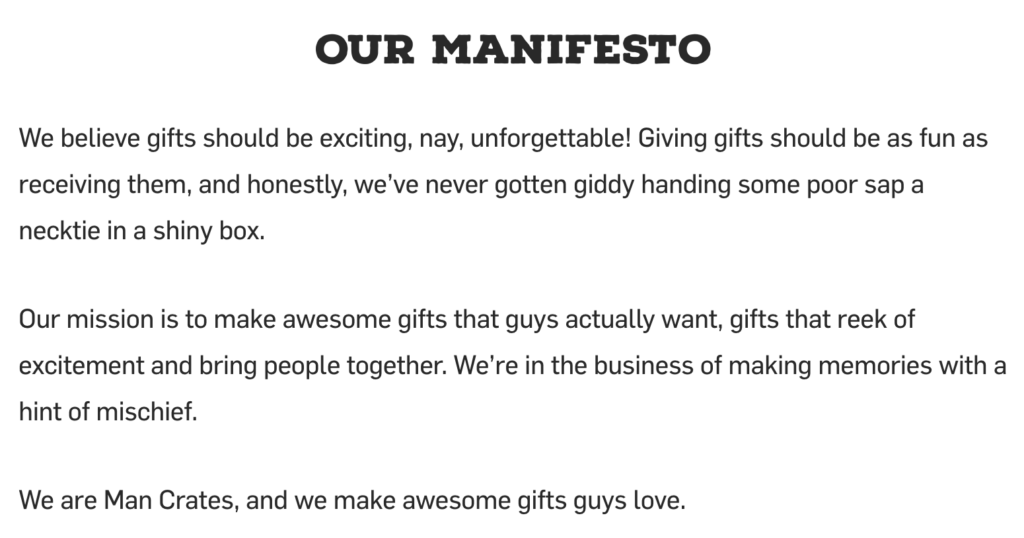
Oatly proudly branded their about page “The Oatly Way” and shows why they’re not like any other company.
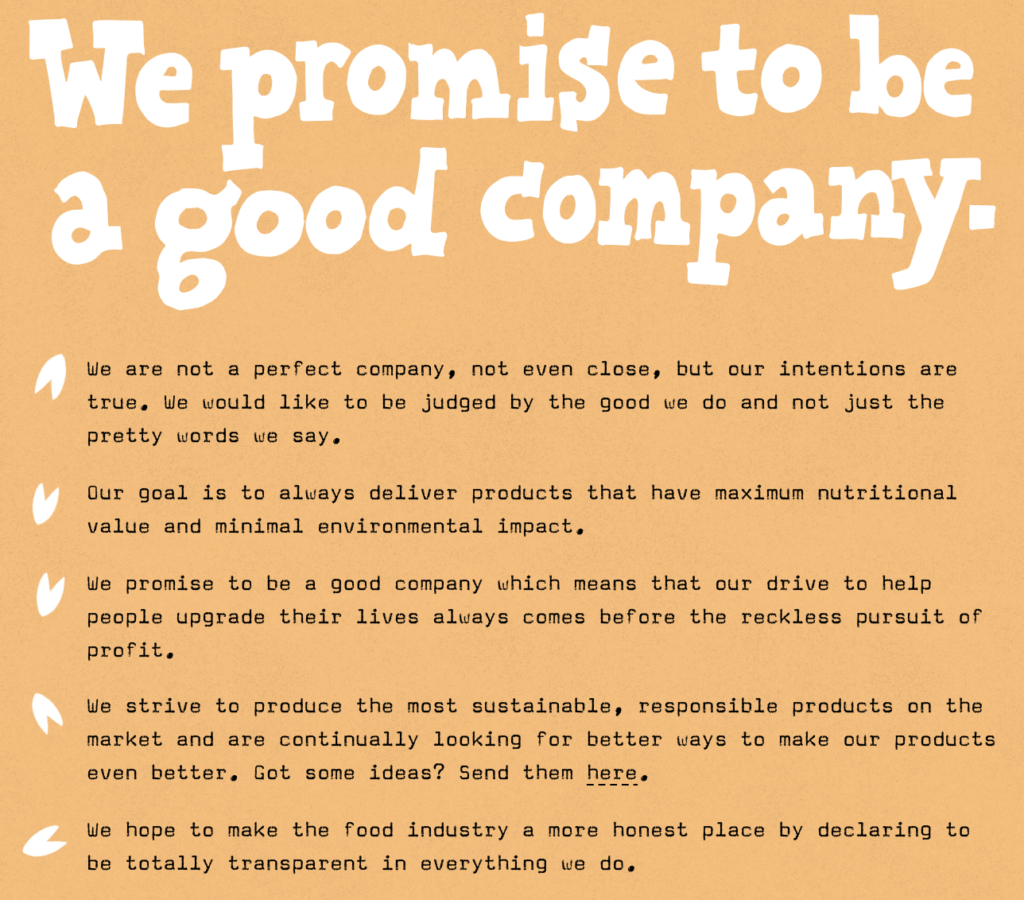
Add personality
Robert Cialdini’s book Influence: The Psychology of Persuasion dedicates a whole chapter to the principle of likability. We naturally like people who are like us and like buying from people we like. Salespeople use this to their advantage by looking for similarities between themselves and the potential buyer. They sprinkle this information casually into the conversation to create a bond.
You can do the same by adding personality to your page. It shows your reader a glimpse of who you really are to create a connection. Anything that shows you’re a normal human being works.
On my about page, I revealed how I watched Avengers: Endgame twice in the cinema and cried both times at the exact same moment. But I didn’t shed a single tear during The Notebook. Whether you think that’s weird or not, this little detail brought us closer.
Here are a few ideas for your about page:
- Introduce yourself and each team member
- Add a picture of you and your team (and your dog or cat)
- Tell a mini-story of how you got started in business
- Add fun personal details like your favorite ice cream flavor
- Talk about your hobbies and what you do in your free time
- Share your favorite joke
Examples:
Graphic designer and art director Andrew Reifman shares three fun facts about himself. Number two is about his favorite hobby.

Copywriter Kira Hug finishes her about page with a glimpse into her past and present life, all written in her iconic voice.
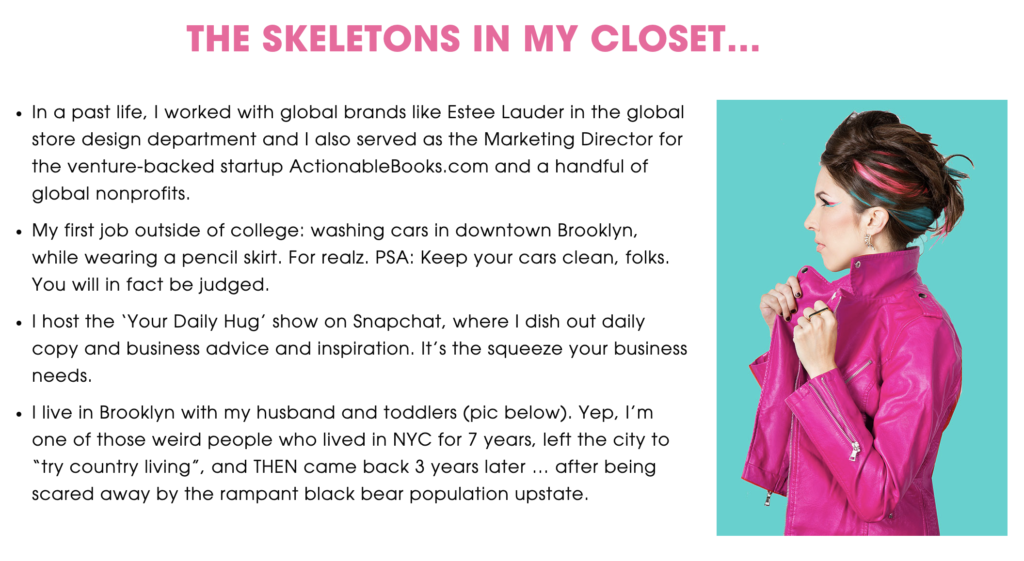
And the founders of creative studio Sycamore Co. share the beautiful story of how they got started with their business.

The bottom line
At a time when we feel more and more disconnected from others, landing on a website that’s personal and honest can be a relief. It’s your chance to put a smile on your visitor’s face and make their life a little easier by showing that you’re the best choice for them.
But I know from experience that writing a great about page is tough. I agonized over writing mine. Being you, it’s so hard to see things clearly for what they really are. How do you bring your enthusiasm onto the page? If the words don’t flow quite right, then I can help. Send me an email at julia@juliasaxena.com, and let’s create an about page that makes your prospects excitedly push the “Contact” button.
